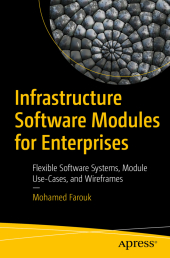 Neuerscheinungen 2017Stand: 2020-02-01 |
Schnellsuche
ISBN/Stichwort/Autor
|
Herderstraße 10
10625 Berlin
Tel.: 030 315 714 16
Fax 030 315 714 14
info@buchspektrum.de |

Mohamed Farouk
Infrastructure Software Modules for Enterprises
Flexible Software Systems, Module Use-Cases, and Wireframes
1st ed. 2017. xxiii, 223 S. 155 SW-Abb., 23 Farbabb. 235 mm
Verlag/Jahr: SPRINGER, BERLIN; APRESS 2017
ISBN: 1-484-23020-5 (1484230205)
Neue ISBN: 978-1-484-23020-6 (9781484230206)
Preis und Lieferzeit: Bitte klicken
Reduce the time spent analyzing infrastructure modules while lowering your cost and resources in the process. Most software project teams that develop custom software build the systems from scratch. With limited budgets and time, they often concentrate on the business functionality and try to minimize or ignore the infrastructure functionality. This book shows you how to develop flexible and and reusable modules that can be enhanced over time.
Software infrastructure modules are the base modules in any software system. This book examines the key functionality supported by each of them and discusses the essential services for other modules.You´ll explore the infrastructure modules required in large enterprise projects and each one will be explained with high-level use-cases, wireframes, and entities.
Add Infrastructure Software Modules for Enterprises to your company´s library today.
What You´ll Learn
Review infrastructure modules and how they interact together or with other business modules
Understand the main functionalities provided by infrastructure modules
Explore the design of infrastructure modules via use-cases, wireframes, and entities
Who This Book Is For
Project team members that implement custom portals or software systems provided by public or private sector organizations.
Mohamed Farouk has worked in analysis and design of software systems for government organizations in Oman, Egypt, and UAE for over 10 years,. His last project was in Oman for the Ministry of Education, Ministry of Commerce and Industry, Ministry of Information and The Ministry of Agriculture.


